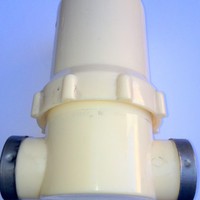Check Your Filter
Posted by Andrew Greess on Nov 4, 2014
Every day our shop repairs pest control sprayers. By far the single largest cause of avoidable problems is filtration. Interestingly, most of our pest control clients insist their technicians regularly check their filters, yet we continue to see problems in this area.
The filtration problems we see can be categorized into 2 main groups:

- Too much filtration.
- Not enough filtration.
Note – for this discussion we will be discussing operational issues only, not design or policy issues.
1. Too much filtration.
This usually means a clogged filter. Filters become clogged because:
- The screen is too fine
- The water quality is poor & filled with debris
- The technician does not check the filter frequently enough.
Clogged filters are a problem because they starve the pump of water. Most pumps will become damaged if run without water. Some can go a little longer without water than others, but generally speaking, running a pump dry is a very bad idea. Running a pump dry can result in serious pump damage up to and including total pump loss. It often leads to downtime and unnecessary repair expenses.
2. Not enough filtration
Insufficient filtration involves a missing filter screen or a screen that is too course and allows debris to enter your spray system and foul pump, hoses, fittings and spray guns. Debris can damage almost any type of pump, and if not removed can quickly turn your pump into junk. Debris downstream from the pump will cause downtime while the parts are cleaned or replaced. Debris in tips is often impossible to remove and tips must be replaced.
Another related problem is a missing filter o-ring which makes a proper seal impossible and prevents the pump from drawing water from the tank.
If technicians are checking filters, these problems should not occur. Since so many pest control professionals tell us their technicians are checking filters, yet we see many clogged filters, we recommend PMP’s do spot inspection of filters to ensure compliance.

